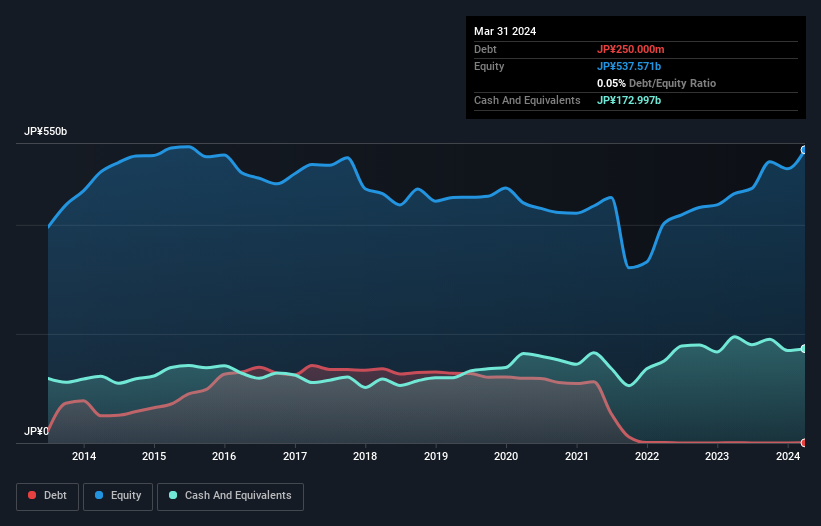
Some say volatility, rather than debt, is the best way to think about risk as an investor, but Warren Buffett famously said that 'Volatility is far from synonymous with risk.' It's only natural to consider a company's balance sheet when you examine how risky it is, since debt is often involved when a business collapses. We can see that Japan Petroleum Exploration Co., Ltd. (TSE:1662) does use debt in its business. But the more important question is: how much risk is that debt creating?
Why Does Debt Bring Risk?
Debt is a tool to help businesses grow, but if a business is incapable of paying off its lenders, then it exists at their mercy. Part and parcel of capitalism is the process of 'creative destruction' where failed businesses are mercilessly liquidated by their bankers. While that is not too common, we often do see indebted companies permanently diluting shareholders because lenders force them to raise capital at a distressed price. Of course, the upside of debt is that it often represents cheap capital, especially when it replaces dilution in a company with the ability to reinvest at high rates of return. The first thing to do when considering how much debt a business uses is to look at its cash and debt together.
See our latest analysis for Japan Petroleum Exploration
How Much Debt Does Japan Petroleum Exploration Carry?
You can click the graphic below for the historical numbers, but it shows that Japan Petroleum Exploration had JP¥250.0m of debt in March 2024, down from JP¥510.0m, one year before. However, its balance sheet shows it holds JP¥173.0b in cash, so it actually has JP¥172.7b net cash.

How Healthy Is Japan Petroleum Exploration's Balance Sheet?
We can see from the most recent balance sheet that Japan Petroleum Exploration had liabilities of JP¥49.1b falling due within a year, and liabilities of JP¥74.3b due beyond that. Offsetting this, it had JP¥173.0b in cash and JP¥41.6b in receivables that were due within 12 months. So it can boast JP¥91.2b more liquid assets than total liabilities.
This surplus suggests that Japan Petroleum Exploration is using debt in a way that is appears to be both safe and conservative. Given it has easily adequate short term liquidity, we don't think it will have any issues with its lenders. Simply put, the fact that Japan Petroleum Exploration has more cash than debt is arguably a good indication that it can manage its debt safely.
But the bad news is that Japan Petroleum Exploration has seen its EBIT plunge 11% in the last twelve months. If that rate of decline in earnings continues, the company could find itself in a tight spot. When analysing debt levels, the balance sheet is the obvious place to start. But ultimately the future profitability of the business will decide if Japan Petroleum Exploration can strengthen its balance sheet over time. So if you want to see what the professionals think, you might find this free report on analyst profit forecasts to be interesting.
Finally, a company can only pay off debt with cold hard cash, not accounting profits. While Japan Petroleum Exploration has net cash on its balance sheet, it's still worth taking a look at its ability to convert earnings before interest and tax (EBIT) to free cash flow, to help us understand how quickly it is building (or eroding) that cash balance. Over the most recent three years, Japan Petroleum Exploration recorded free cash flow worth 55% of its EBIT, which is around normal, given free cash flow excludes interest and tax. This cold hard cash means it can reduce its debt when it wants to.
Summing Up
While we empathize with investors who find debt concerning, you should keep in mind that Japan Petroleum Exploration has net cash of JP¥172.7b, as well as more liquid assets than liabilities. So we don't have any problem with Japan Petroleum Exploration's use of debt. When analysing debt levels, the balance sheet is the obvious place to start. But ultimately, every company can contain risks that exist outside of the balance sheet. Be aware that Japan Petroleum Exploration is showing 2 warning signs in our investment analysis , and 1 of those is a bit unpleasant...
Of course, if you're the type of investor who prefers buying stocks without the burden of debt, then don't hesitate to discover our exclusive list of net cash growth stocks, today.
New: Manage All Your Stock Portfolios in One Place
We've created the ultimate portfolio companion for stock investors, and it's free.
• Connect an unlimited number of Portfolios and see your total in one currency
• Be alerted to new Warning Signs or Risks via email or mobile
• Track the Fair Value of your stocks
Have feedback on this article? Concerned about the content? Get in touch with us directly. Alternatively, email editorial-team (at) simplywallst.com.
This article by Simply Wall St is general in nature. We provide commentary based on historical data and analyst forecasts only using an unbiased methodology and our articles are not intended to be financial advice. It does not constitute a recommendation to buy or sell any stock, and does not take account of your objectives, or your financial situation. We aim to bring you long-term focused analysis driven by fundamental data. Note that our analysis may not factor in the latest price-sensitive company announcements or qualitative material. Simply Wall St has no position in any stocks mentioned.
Have feedback on this article? Concerned about the content? Get in touch with us directly. Alternatively, email editorial-team@simplywallst.com
About TSE:1662
Japan Petroleum Exploration
Explores, develops, produces, and sells oil, natural gas, and other energy resources in Japan, Europe, North America, and the Middle East.
Flawless balance sheet, undervalued and pays a dividend.
Market Insights
Community Narratives



